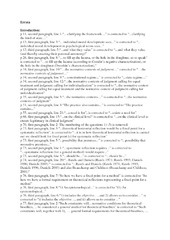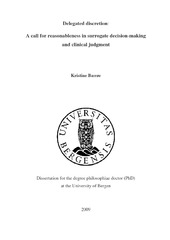| dc.contributor.author | Bærøe, Kristine | en_US |
| dc.date.accessioned | 2010-04-07T11:28:20Z | |
| dc.date.available | 2010-04-07T11:28:20Z | |
| dc.date.issued | 2009-01-30 | eng |
| dc.identifier.isbn | 978-82-308-0728-6 (print version) | en_US |
| dc.identifier.uri | https://hdl.handle.net/1956/3859 | |
| dc.description.abstract | In a democratic welfare state, how should individual judgment be exercised and constrained when someone is making decisions on behalf of another who is not considered competent to make his or her own decisions? How should we expect individual judgment to work when a physician makes a particular claim for just health care on behalf of his or her patient? These are the general questions this thesis attempts to answer. As a result of theoretical discussions, I outline two frameworks as a basis for new policies to ensure the quality and accountability of the discretionary decisions called for in these circumstances. The first framework I propose challenges a well established procedure for surrogate decisionmaking. Personal autonomy is a concept of self-governance that concern individuals’ ability to set ends for themselves and to choose their acts according to their aims and values. The practice of requiring informed consent is closely connected to this version of autonomy as it is a way of respecting individuals and their ability to decide for themselves. From this point of view, a logically organised sequence of events follows: we are considered competent to make our own decisions until this competence is doubted by someone else, we then might have our competence considered and may potentially be assessed as not competent to make certain decisions about our own well-being. Then surrogate(s) will be appointed to make the decisions on our behalf. This sequence of events allows for exploitation in a way that could be avoided. Moreover, as I have tried to clarify, this sequence of events allows for what I have called ‘structural arbitrariness’ in how potentially not competent vulnerable people are treated: 1) it is up to others to initiate an assessment of competence, potentially for more or less arbitrary reasons, 2) it is up to others to proceed with an assessment process that I have shown relies on individual variables which can influence the arbitrariness of the outcome. To this we have to add the possibility that: 3) if a person is found by an assessment to be noncompetent, he or she is deprived of credibility and is prevented from correcting or appealing on the presumption he or she does not understand his or her best interest. Since treating vulnerable people arbitrarily cannot be seen as a respectful way of treating others, I suggest a procedure to ensure reasonableness in the decision-making process by involving several people other than just the appointed surrogate(s). This process is supposed to safeguard against exploitation and against insufficiently justified decisions made on behalf of those assessed not competent to make their own decisions. The second framework I suggest uses a novel way of thinking about the relation between macro- and micro-level decision-making in terms of legitimacy. There has been much discussion about how to obtain legitimacy at macro-level priority setting in health care by using fair procedures. Despite the fact that just health care totally hinges on the decisions of individual clinicians or health workers at the micro-level, surprisingly little attention seems to be paid to the legitimacy of these decisions. Assuming that guidelines are legitimate, what are the conditions that have to be met in order to ensure that individual claims on health care are aligned with an overall concept of just health care? I argue that macro- and micro-level decision-making belong to different contexts of legitimacy so that legitimacy does not automatically transfer from legitimate guidelines to individual clinical decisions. Using considerations about the relation between authorised discretion and regulating guidelines in terms of horizontal and vertical equity, I suggest conditions that have to be met in order for micro-level distribution of health care to be legitimate and fair. These conditions add up to a framework for reasonable clinical judgments. In addition, this framework also addresses and incorporates theoretical conditions affecting clinicians’ motivation to meet the requirement of fairness in distribution. I argue that the proposed framework must be taken as a supplement to a framework that has legitimate guidelines at the macro-level, and that macro- and microlevel frameworks must work together to ensure fair distribution within a just health care system. This thesis is organised along an important line of reasoning: Both surrogate decisions and distribution of health care at the clinical level are based on delegated discretion. Certain normative constraints are thereby passed onto the individual judgments of surrogates and clinicians. I approach these constraints by two different epistemological strategies. On the one hand, in the articles which form the basis of this thesis, I argue in favour of the mentioned normative frameworks mentioned above. The arguments provided here in crucial ways seek support by appealing to intuitions; intuitions about respectful treatment of other people and intuitions about equity, according to each framework respectively. On the other hand, I have followed another structure of argumentation in the Introduction part of the thesis. I have approached the specific topics of this thesis by considering how, in general, the normative constraints on delegated discretion are linked to principles derived from moral, personal and political versions of autonomy. These concepts are taken to represent central values of a democratic welfare state. The frameworks I propose are shown to be substantive realisations of these general conditions for exercising discretionary judgment. They are accounted for by appealing to political theory and social values. In this way, I have tried to clarify the project I originally categorised as ‘bioethics’ by looking at its inherent political structure as well. I consider the two-way justification of the suggested frameworks to strengthen the results of the theoretical discussions provided in this thesis. | en_US |
| dc.language.iso | eng | eng |
| dc.publisher | The University of Bergen | eng |
| dc.relation.haspart | Paper I: Bioethic 24(2), Bærøe, Kristine. Patient autonomy, assessment of competence and surrogate decision making: a call for reasonableness in deciding for others, pp. 87-95. Copyright 2008 Wiley-Blackwell. Full text not available in BORA. The published version is available at: <a href="http://dx.doi.org/10.1111/j.1467-8519.2008.00672.x" target="blank"> http://dx.doi.org/10.1111/j.1467-8519.2008.00672.x</a> | en_US |
| dc.relation.haspart | Paper II: Tidsskrift for Velferdsforskning 8(2), Bærøe, Kristine, Klinisk Skjønn og Prioriteringer, pp. 90-99. Published version. Copyright 2005 Fagbokforlaget. All rights reserved. Reproduced with permission. | en_US |
| dc.relation.haspart | Paper III: Theoretical Medicine and Bioethics 29 (2), Bærøe, Kristine, Priority setting in health care: On the relation between reasonable choices on the micro-level and the macro-level, pp. 87-102. Copyright 2008 Springer. Full text not available in BORA. <a href="http://dx.doi.org/10.1007/s11017-008-9063-3" target="blank"> http://dx.doi.org/10.1007/s11017-008-9063-3</a> | en_US |
| dc.relation.haspart | Paper IV: Journal of Medical Ethics 35(8), Bærøe, Kristine, Priority-setting in health care: a framework for reasonable clinical judgments, pp. 488-496. Published version. Copyright 2010 by the BMJ Publishing Group Ltd & Institute of Medical Ethics. All rights reserved. Published version. Reproduced with permission. The published version is also available at: <a href="http://dx.doi.org/10.1136/jme.2007.022285" target="blank"> http://dx.doi.org/10.1136/jme.2007.022285</a> | en_US |
| dc.title | Delegated discretion: A call for reasonableness in surrogate decision-making and clinical judgment | en_US |
| dc.type | Doctoral thesis | |
| dc.subject.nsi | VDP::Medisinske Fag: 700::Helsefag: 800::Medisinsk/odontologisk etikk, atferdsfag, historie: 805 | nob |



